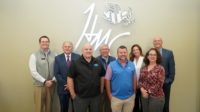Northeastern Supply celebrates 75 years
Baltimore-based PHCP-PVF supplier hits milestone anniversary

Starting from modest beginnings back in 1945, Northeastern Supply is the definition of hard work translating into continuous growth. The Cook family’s roots with Northeastern date back to 1964 when the late John H. Cook was hired as branch manager, and then bought the Baltimore-based PHCP-PVF distribution company in 1972.
“It was a very small company back then; we operated out of a line of several row houses (townhouses) in Baltimore. I worked at Northeastern through high school and college. We didn’t have any forklifts or manpower, so it was a lot of manual labor and hard work,” says CEO, Steve Cook, John H. Cook’s son and previous American Supply Association president.
Hard work comes up often when speaking to Northeastern’s leadership team. “I truly believe that we work harder than most of our competitors,” Steve Cook explains. “We get into a job and knock it out, while fighting for our customer. We’re pretty scrappy and nimble.”
Now, the company operates 36 locations across the Northeast. When asked about the expansive growth, Northeastern President Stan Allen explains that in addition to working hard, serving customers is the main, driving factor.
“From the beginning, John instilled the importance of customer service, and no matter if an employee has been there 15 years or two years, you can see they embody that principal,” he says.
Although the supply chain is facing difficult times that require some adjustments and changes to business, Allen explains Northeastern won’t waiver from its core values.
“Obviously, we are going to make changes in some areas because we have to adapt to what’s going on, but we can’t change our identity and core competencies; no matter what era we’re in, those will remain the same,” he notes.
Northeastern Supply operates under its inverted triangle model that clearly outlines customers come first. Next in line under customers are the sales team, the operations team, branch managers, the corporate team, and then the executive team at the bottom in the smallest point of the triangle. This model holds the company accountable for what groups of people come first, again reiterating the importance of a customer-first attitude.
Northeastern facilitates its customer commitment through its customer touch program. The program is built so that at all levels, the company has regular interpersonal interaction with its customers.
“I’ve worked at a couple other distribution companies, and Northeastern touches the customer more often and in more ways than I’ve seen before,” Allen says.
Interacting with customers can be regular phone calls and visits, or group events hosted by the company.
“We’ve done goose hunts, fishing trips, crab dinners, sporting events and holiday parties,” Allen explains. “All of them help us build real relationships with our customers.”
Stephanie Cook, director of training and safety, as well as third-generation leadership at Northeastern, notes that these events are special because customers can often find Allen and/or her father (Steve Cook) there.
“It’s not often you get to see the president or CEO of a company multiple times a year,” she says. “This gives people the opportunity to have casual conversations with them and ask whatever questions they want to ask.”
Another way the company interacts with customers and potential customers is through engagement with local charities. Northeastern, along with the Cook family, have always prioritized charity efforts, working with organizations such as Cool Kids Campaign, a foundation supporting children with cancer, and the Helping Up Mission, which provides hope to men fighting addiction and homelessness through recovery programs and services.
“We like to choose charities that our employees are passionate about,” says Steve Cook. “If someone has come to us with a charity they want to support, I don’t think we have ever said ‘no.’”
The company takes it a step further, encouraging its employees to volunteer for charities of their choosing by offering paid volunteer time off every year.
Since face-to-face interaction is currently limited, meaning group events aren’t being held, Northeastern is focusing on improvements to its e-commerce platform and building an app.
Jamie Leo, marketing and creative service manager, explains how the company has been diligent in building a useful e-commerce platform based on customer wants.
“We did some beta testing and surveyed customers to make sure we are putting out exactly what they need,” she says. “Both the website and the app offer a place for customers to access everything in one spot; they can see past invoices, previous orders and they can even scan UPC codes using their phone camera to place orders.”
As far as technology goes, Northeastern is continuing to expand services and features online, such as video content, blogs and training webinars. Throughout the COVID-19 pandemic, Northeastern has been able to remain open to walk-in customers since it is a pick-your-own product facility, allowing it to continue in-person interactions with customers. Allowing for text-in orders, revamping its e-commerce platform and remaining open under strict cleaning and distance guidelines have all ensured there are no service gaps during lockdown.
The Northeastern future
Continued expansion is on the horizon for Northeastern Supply. When asked about 10-year goals, Allen explains that controlled growth is key.
“We want to grow at a manageable rate and never get ahead of ourselves,” he says. “If we grow too fast, we make it harder to uphold the high standard of service we live by.”
Allen states Northeastern has been looking into acquiring companies and hopes to do so in the near future, as soon as it finds the perfect fit. Another key aspect that makes expansion possible is finding the right people. Allen explains that, like the rest of the trade industries, finding skilled workers is getting harder and harder. Northeastern plans to continue to work with community colleges and high schools to recruit young workers who want to build a career within the supply chain.
Allen notes the pandemic may influence a positive change for the skilled labor shortage. “With everything going on and businesses closing, people are realizing now that it’s not a bad idea to be working in an essential business,” he says. “I think people are realizing the importance of the supply chain, and that you can build a reliable career doing what we do.”
After 75 years of PHCP-PVF distribution, it’s clear that Northeastern has sustained its success through unwavering core values, and the company has every intention of moving forward with blue-collar hard work and a family atmosphere for years to come.
Looking for a reprint of this article?
From high-res PDFs to custom plaques, order your copy today!






